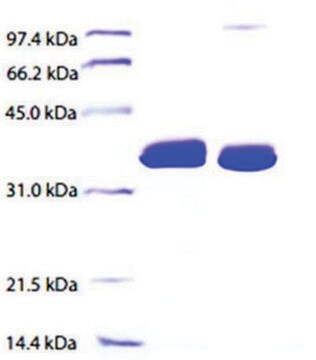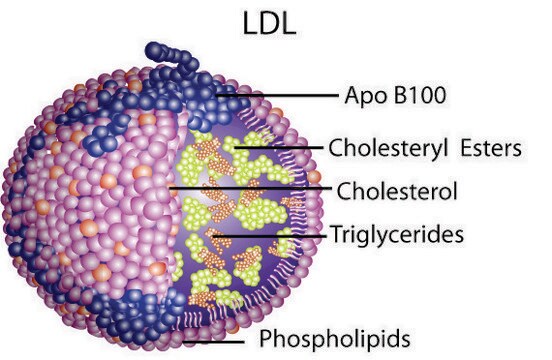178468
Apolipoprotein E, Human Plasma, Very Low-Density Lipoprotein
Native apolipoprotein E from human plasma. A major component of VLDL and IDL. Serves as a major cholesterol carrier. Essential for the normal catabolism of triglyceride-rich lipoprotein constituents.
Sinonimo/i:
Apo E
Autenticatiper visualizzare i prezzi riservati alla tua organizzazione & contrattuali
About This Item
Codice UNSPSC:
12352202
Prodotti consigliati
Livello qualitativo
Saggio
≥95% (SDS-PAGE)
Forma fisica
liquid
Produttore/marchio commerciale
Calbiochem®
Condizioni di stoccaggio
OK to freeze
avoid repeated freeze/thaw cycles
Condizioni di spedizione
wet ice
Temperatura di conservazione
−20°C
Descrizione generale
Native apolipoprotein E from human plasma. A component of VLDL and a subclass of HDL. Serves as a ligand for LDL receptors, where it participates in the transport and redistribution of cholesterol and other lipids. Also functions in immunoregulation, cell growth, and differentiation. Present in normal plasma at concentrations of 50 µg/ml.
Native apolipoprotein E from human plasma. A component of VLDL and of a subclass of HDL. Present in normal plasma at concentrations of 50 µg/ml. Serves as a ligand for LDL receptors, where it participates in the transport and redistribution of cholesterol and other lipids. Also functions in immunoregulation and cell growth differentiation. Inhibits mitogen-induced T-lymphocyte proliferation and modulation of smooth muscle cell differentiation.
Confezionamento
Please refer to vial label for lot-specific concentration.
Attenzione
Toxicity: Standard Handling (A)
Stato fisico
In 50 mM NH₄HCO₃, pH 8.0.
Nota sulla preparazione
Prepared from plasma that has been shown by certified tests to be negative for HBsAg and for antibodies to HIV and HCV.
Ricostituzione
Following initial thaw, aliquot and freeze (-20°C).
Altre note
Kelly, M.E., et al. 1994. Cell Immunol. 159, 124.
Mahley, R.W. 1988. Science 240, 622.
Rall, S.C., et al. 1986. Methods Enzymol. 128, 273.
Mahley, R.W. 1988. Science 240, 622.
Rall, S.C., et al. 1986. Methods Enzymol. 128, 273.
Note legali
CALBIOCHEM is a registered trademark of Merck KGaA, Darmstadt, Germany
Esclusione di responsabilità
RESEARCH USE ONLY. This product is regulated in France when intended to be used for scientific purposes, including for import and export activities (Article L 1211-1 paragraph 2 of the Public Health Code). The purchaser (i.e. enduser) is required to obtain an import authorization from the France Ministry of Research referred in the Article L1245-5-1 II. of Public Health Code. By ordering this product, you are confirming that you have obtained the proper import authorization.
Codice della classe di stoccaggio
11 - Combustible Solids
Classe di pericolosità dell'acqua (WGK)
WGK 1
Punto d’infiammabilità (°F)
Not applicable
Punto d’infiammabilità (°C)
Not applicable
Certificati d'analisi (COA)
Cerca il Certificati d'analisi (COA) digitando il numero di lotto/batch corrispondente. I numeri di lotto o di batch sono stampati sull'etichetta dei prodotti dopo la parola ‘Lotto’ o ‘Batch’.
Possiedi già questo prodotto?
I documenti relativi ai prodotti acquistati recentemente sono disponibili nell’Archivio dei documenti.
Jian-Ying Zhou et al.
Journal of proteome research, 9(10), 5133-5141 (2010-08-12)
The discovery of biomarkers for neurodegenerative diseases will have a major impact on the efficiency of therapeutic clinical trials and may be important for understanding basic pathogenic mechanisms. We have approached the discovery of protein biomarkers for amyotrophic lateral sclerosis
Joanna L Richens et al.
International journal of molecular epidemiology and genetics, 5(2), 53-70 (2014-06-25)
Previous mass spectrometry analysis of cerebrospinal fluid (CSF) has allowed the identification of a panel of molecular markers that are associated with Alzheimer's disease (AD). The panel comprises Amyloid beta, Apolipoprotein E, Fibrinogen alpha chain precursor, Keratin type I cytoskeletal
Andrzej S Pitek et al.
PloS one, 7(7), e40685-e40685 (2012-07-26)
It is now well established that the surface of nanoparticles (NPs) in a biological environment is immediately modified by the adsorption of biomolecules with the formation of a protein corona and it is also accepted that the protein corona, rather
Il team dei nostri ricercatori vanta grande esperienza in tutte le aree della ricerca quali Life Science, scienza dei materiali, sintesi chimica, cromatografia, discipline analitiche, ecc..
Contatta l'Assistenza Tecnica.


